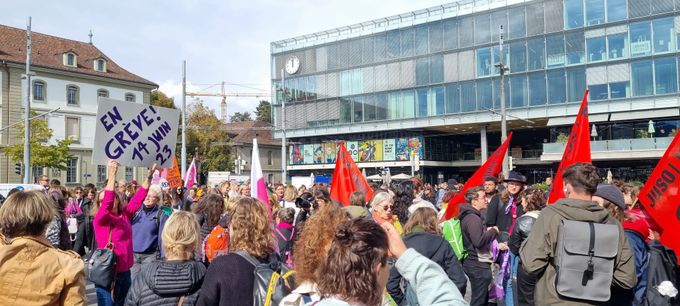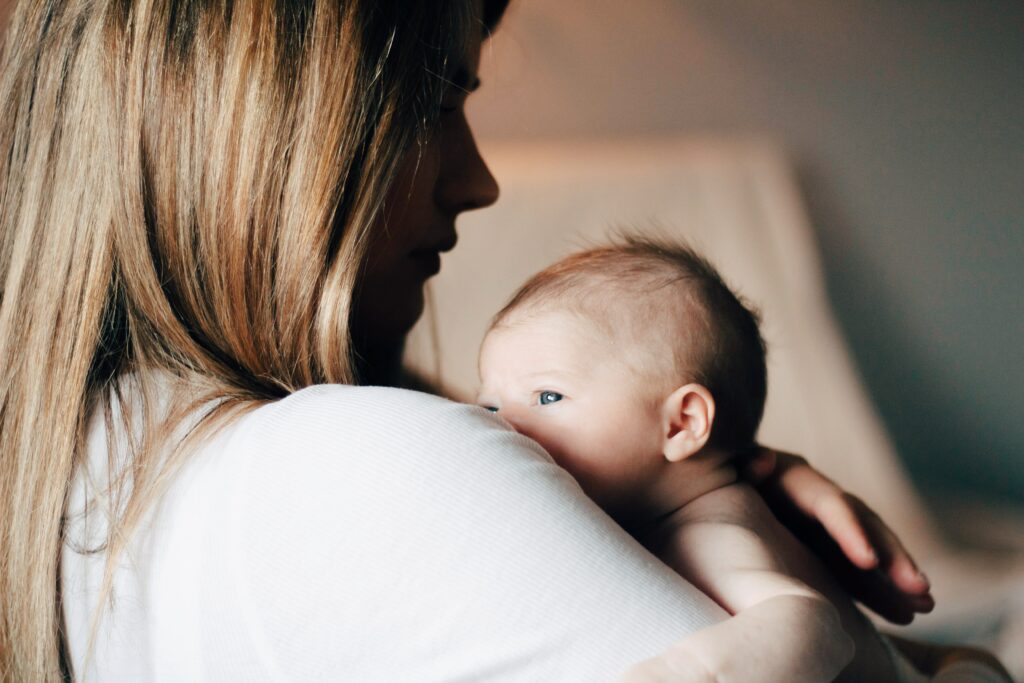الأثنين, نوفمبر 14th 2022
Switzerland has made significant progress in gender equality, but the alpine country could do better. For example, women’s salaries and childcare responsibilities are still not on equal footing with their male counterparts. Then again, a human rights court recently ruled that Swiss men have been shortchanged for decades.

Switzerland loves tradition, but both Swiss men and women are asking for updates to its gender inequalities.
Switzerland promotes equality both in the workplace and at home, making it one of the best-ranked countries for women’s rights, according to an Organization for Economic Co-Operation and Development (OECD) report. But as a recently divisive vote on equalizing the retirement age of men and women would suggest, the country still has a long way to go.
Although Swiss women were not granted voting rights until 1971 (and in one canton not until 1991), the rates of progress for Swiss women have improved in recent years despite the profound impact that the Covid-19 pandemic has had on widening gender gaps in care burdens and paid employment. Women bear the brunt of the economic and social fallout globally. A key factor setting Switzerland apart is that women’s rights and gender equality are part of its new Sustainable Development Strategy guided by the 2030 Gender Equality Strategy.

Outdated maternity leave policies and a lack of early childcare facilities has forced a majority of Swiss women to work part-time, if at all, after giving birth.
Women in the workforce
Double-income families have become the norm in Switzerland as the rate of women in the workforce has increased 22 percentage points to 82 percent over the last 30 years. Meanwhile, a statistical study conducted the previous year by Switzerland’s Federal Statistics Office (FSO) revealed that 97 percent of men with minor children were in the workforce compared to 99 percent in 1991.
What is worth noting, however, is that most of the work performed by women is on a part-time basis; about 78 percent of employed mothers work part-time. However, one-in-nine employed mothers in Switzerland abandon the labor market once they give birth to their first child because many mothers struggle to find childcare solutions.
Wage inequality in Switzerland is still a reality, and the gap is narrowing slowly. In 2018, the wage disparity was 43.2 percent for all hours worked between the ages of 15 and 64. The national statistics on the wide pay gap – seen in the Gender Overall Earnings Gap (GOEG) study – show that Switzerland ranks third out of 30 European countries – just behind Austria and the Netherlands – with the most significant wage gap between men and women.
To combat this disparity, Switzerland has put legislation targeted to lessen discrimination by mandating that larger companies report wages for all staff. More specifically, an updated version of the Gender Equality Act now requires employers with over 100 employees to conduct an equal-pay analysis which would be audited and shared with shareholders and employees. Furthermore, gender representation thresholds were put into place for large listed companies. Raising the target rate from 30 percent to 40 percent for top management is a positive step in the right direction.

Within hours of Swiss voters approving a change in women’s pension benefits, protesters took to the streets saying that women were being shortchanged.
Gender pension gap
According to the Swiss economy ministry, the gender pension gap was 34.6 percent in 2021. The total annual pension for women was CHF 18,924, lower than that for men, on average. The differences in the pension gap were primarily due to wage gaps between the genders over time and employment participation.
One equalizing tactic the government had used for decades was allowing women to retire one year earlier than their male counterparts; but, Swiss citizens recently voted to increase women’s retirement age by one year to 65, in line with their male counterparts. Along with the age increase, voters backed a new pension reform under which the VAT will increase up to 0.4 percent in order to finance the state-backed Old Age and Survivors Insurance (OASI), one of the three pillars of the Swiss pension system. (Read more on the voter referendum).
Not only did the measure pass by the narrowest of margins (50.6 percent voted in favor), it was also the most divisive vote in Swiss history, according to a survey released from survey group gfs.bern. About 65 percent os Swiss men voted to increase the age, while only 38 percent of women supported the change. In the days following the vote, protesters turned out in the thousands on Swiss streets saying that women were being shortchanged, yet again.
“Trying to equalize men and women at the end of life is not the way to do it,” says Anne Fremont, a UK expat who became a Swiss citizen in 2012. Fremont has attended a number of protests for women’s rights in Switzerland.
“The problem needs to be addressed earlier in life. Are women getting enough support after they give birth? What about childcare? Are they making as much as their male colleagues? That is where Switzerland needs to focus,” she added.

Swiss maternity leave is miles better than in countries like the U.S., but still falls short. Which is why more than 10 percent of new mothers in Switzerland do not return to the workforce.
Maternity leave
Among high-income countries, Switzerland ranks 38th out of 41 countries, according to the report ‘Where Do Rich Countries Stand on Childcare?’ published by UNICEF’S Office of Research. Paid maternity leave allows mothers to bond with their babies, lowers post-partum depression, supports healthy child development, and increases gender equality. However, the report discloses that fewer than half of the OECD/EU countries offer at least 32 weeks of leave with full pay for mothers. (Having a baby in Switzerland: Is it worth it?)
Mothers working in Switzerland are entitled to a statutory maternity leave of 14 weeks at a pay rate of 80 percent of their average income once they give birth. One caveat is that the maximum amount granted is capped at CHF 5880 per month or CHF 196 per day. Therefore, for high-income earners – women who earn over CHF 7350 per month – the funds they receive will be much less than 80 percent of their earned income. Furthermore, women on maternity leave are still mandated to pay into their employer’s pension fund, which reduces the benefits they receive even more.
The salary reduction, coupled with the required pension fund contributions, can bring about an excessive financial burden that forces some mothers to return to work – at least part-time – once (and if!) they secure childcare.

While the Swiss government provides childcare beginning as early as six months, spots are so limited most families do not get to take advantage of the system.
Childcare costs and responsibilities
The cost of childcare in Switzerland is prohibitively expensive for average-income earners. The cost of preschools and daycares (called krippe أو kita in German and crèche in French) vary from canton to canton, but generally, childcare facilities charge between CHF 110 to CHF 130 per day. Therefore, a couple earning an average salary would have to spend between 30 to 50 percent of their income to pay for two children in daycare. (Read more: The magic of growing up in Switzerland).
Moreover, the costs of raising children in the years following childcare are very high. According to the المكتب الإحصائي الاتحادي, raising two children from birth to 18 years in Switzerland costs, on average, a staggering half a million francs. The steep daycare prices and the exorbitant cost of living in Switzerland leave women in a quandary. Should they continue working and pay a sizeable portion of their income for childcare? Many mothers question whether it is worth staying employed.
Only one in three children attend daycare due to the lack of affordability and accessibility. The Swiss government is seeking ways to ease the financial burden on parents and increase qualitative standards in childcare to provide a more vital work-life balance and equitable opportunities for children.
Currently, available daycare spaces are extremely limited. The cantons are looking to provide additional daycare places at a more reasonable price. But, because of the shortage, many parents cannot even secure a place in a daycare facility. To make matters worse, widespread daycare restrictions and closures due to the Covid-19 pandemic leave women little choice. As a result, most mothers overwhelmingly end up carrying the brunt of early childcare responsibilities.

Swiss men are required to serve in the military in some capacity — but they never see action, thanks to its neutrality.
It is not a perfect system for men either
The Swiss government has been discriminating against men when it comes to doling out pension benefits, the European Court of Human Rights (ECHR) ruled last month. The ruling asks Switzerland to re-write its Old-Age and Survivor’s Insurance (AHV) pension law and pay back millions in retroactive fees.
As the law stands now, widowed women are paid a pension for the rest of their lives, while widowered men only receive those same payments if they have children under the age of 18. The law is based on an outdated concept of the “male breadwinner.”
The law first came under scrutiny with the case of a Swiss man, Max Beeler. When Beeler’s wife died in an accident in the early 1990s, Beeler left his job to care for their two young children. He was 41 at the time. Beeler received a pension until 2010, when his youngest child turned 18 years old. If Mr. Beeler had died instead of his wife, she would have kept receiving the pension payments for the rest of her life; but, his were cut off promptly on the child’s 18ال birthday. Moreover, his wife would have received the payments whether they had children or not. She would have even received payments if they had been divorced, under Swiss AHV law.
Yet another area where Swiss men say they are being shortchanged is their compulsory military service. In the last year, there has been a call for women to begin serving compulsory military service, like their male counterparts. While some supporters say women should have the option to engage in a community service style military service, others say that both men and women should have the option.
“Why are we even discussing gender equality in Switzerland if men are stilled required to give two years of their lives to the military?” says Ronald Drent, an American expat and father of three boys. “This affects every young man in Switzerland. I think the Swiss government should start there first.”
Switzerland, like many countries, continues to find its footing in the search for gender equality; and, many of its first steps appear to have been wobbly, at best.
يمكن مشاركة هذه المقالة وإعادة طباعتها مجاناً، شريطة أن تكون مرتبطة بشكل بارز بالمقالة الأصلية.
